Changing our response to change
Jodi Armstrong • May 15, 2020
Changing our response to change
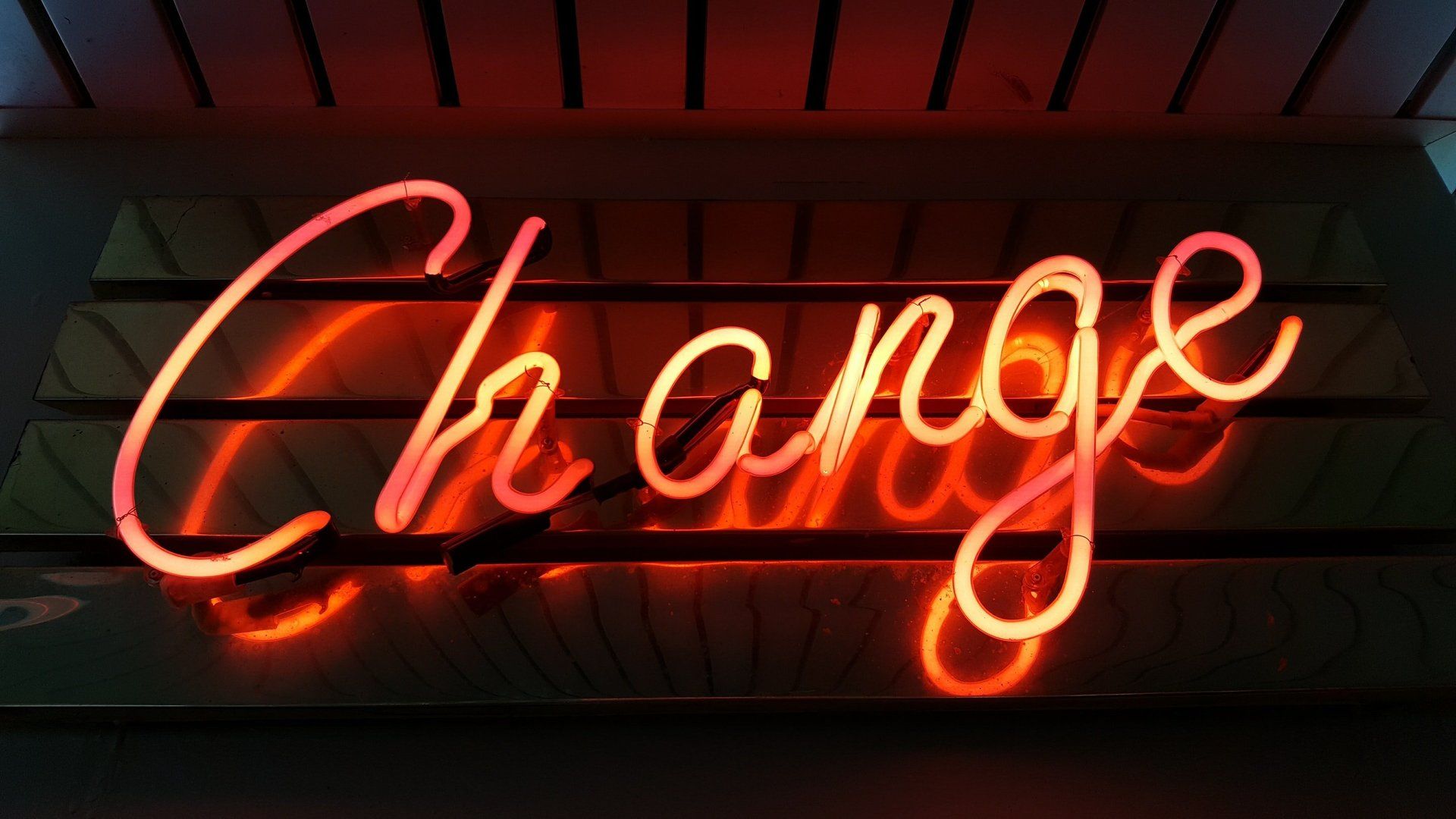
In the world around us there is only one constant guarantee and it is that of change. So much of our environment is transitory particularly during these uncertain times where we face a worldwide pandemic. Our ability and our children's ability to adapt to change is increasingly tested. In the past few weeks’ children have been asked to adapt to being separated from their friends, to a lack of normal schooling and to no more trips to parks, beaches and play areas. They have been asked to accept that they will no longer be able to hug members not of their immediate family even some that they previously spent every day with. They have been asked to adapt to huge changes in their routine and to do this with minimal emotional disturbance. We know that even small changes to a child's world have much more of an impact on them than they do on more mature adults and this emotional turmoil often manifests in different ways. Change should be the most important skill taught, however it is often one we try to protect ourselves and our children from. Our brain is wired to dislike change or something that is unknown. This is a primitive response in order to protect us, however to thrive in adapting situations we need to become comfortable with uncertainty. Children need to continue to feel safe and secure in changing situations so that they can be their best selves and live happy lives. They need to continue to have a strong belief in themselves and their abilities despite changing circumstances around them. They require adaptation when things don't go as they had planned or they are thrown a curveball in life. This is a skill they can then carry with them into adulthood.
So how do we teach this essential skill to our little people? How do we foster this idea that change is necessary and can be good? Here are some ideas;
- Children need to be surrounded by a positive environment and people who love them, who use positive language about the world and who impart foundational beliefs which will affirm their identity.
-In all situations show your child that something good can come of change. Teach them how to find the silver linings.
-When facing a challenge it is important to have unique thinking patterns or ways of looking at a situation. Teach your child how to keep an open mind so that they can identify opportunities for problem solving.
-Do not compare yourself with others and teach your children to do the same. Highlight their unique talents and life privileges so that they learn that nothing is gained by playing the victim.
- When your child is faced with a change, remind them of all the changes they have overcome in the past and how resilient they actually were and are.
-Show your child how to acknowledge their emotions but not always feed into them. Emotions are there to guide us but they are temporary and more positive ones can be chosen.
- Talk to children about difficult changes you have overcome in your life so that they may see that change is inevitable and embracing it will cause less pain than resistance. Share your experiences expressing how each change made you feel and what helped you overcome it.

Going to boarding school is a thrilling journey, but it can also feel a little overwhelming at first, and it is perfectly natural to feel both these emotions! For parents, the thought of their child living away from home may be both comforting and hard. It’s heartening to know that your child is becoming more independent while still being cared for, but it can also be hard to get used to. Our boarding facilities at Crawford International North Coast welcome students from as young as Grade 6 and are meant to feel like a home away from home. From the first day, each student has their own room, which gives them a private space they can make their own. Every space starts off as a blank canvas, ready for students to add their own touches that show who they are and make them feel at home. Having a place to go that feels safe and pleasant after a packed day of lessons, sports, and other activities makes a big difference. Our highly experienced team encourages students to bring personal items from home that are familiar and make them feel at home. A Bluetooth speaker, a scented diffuser with a scent familiar to home, or framed family photos can make the room feel more like their own right away. There are a lot of ways boarders can make their rooms feel like a cozy refuge. To create a room, warm that is warm and stylish, students can think about adding fairy lights, soft throw blankets, colourful cushions, Polaroid photo walls, indoor plants, motivating books, or a plush rug. These small details make the room more than simply a place to sleep; they make it a place to recharge and show off their creativity. These things make a plain room feel like their own, motivating, and intimate. At Crawford International North Coast, boarding is more than just a place to stay. It's a time of independence, privacy, and community when every student thrives!. Our boarding ensures comfort and connection while our campus offers safety and serenity for our 100 boarders. Located just 10 minutes from Durban’s King Shaka International Airport, we are conveniently located for all our students travelling to Durban by air
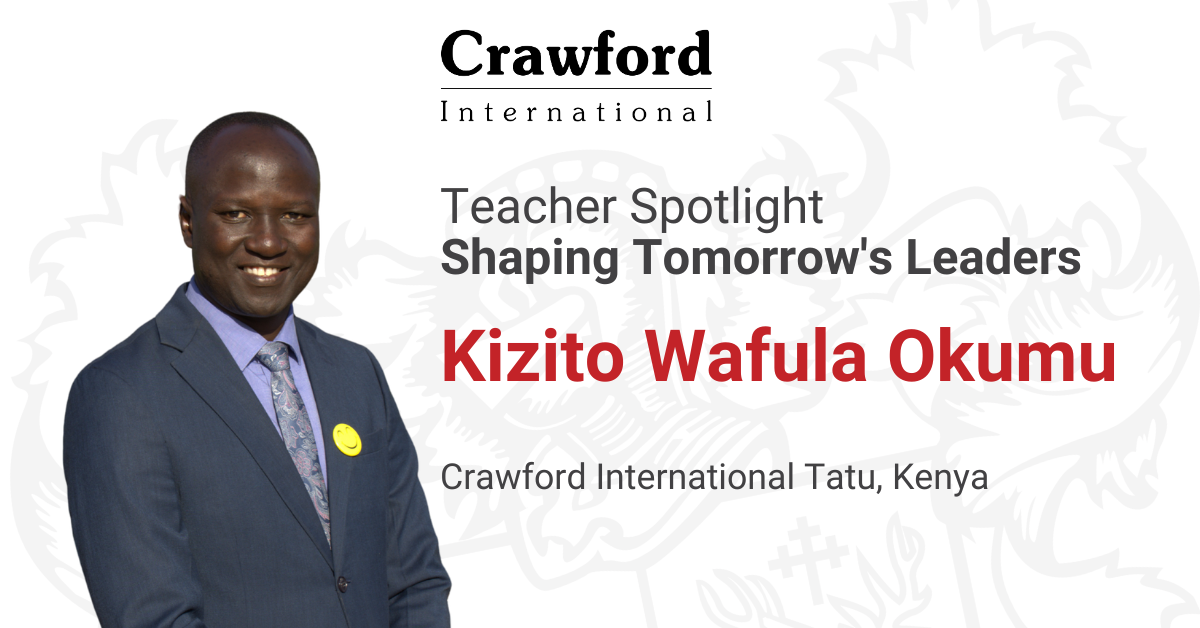
At Crawford International Tatu City in Kenya, Mr Kizito Wafula Okumu has been part of the journey from the very beginning. As a pioneer teacher who joined the campus in 2018, he has helped shape both the academic and co-curricular identity of the school during its formative years. Mr Okumu teaches French from Primary through to A Level, bringing more than 16 years of experience in the subject. His path into teaching began with a simple yet influential note written in his Form 2 French book by his own teacher, encouraging him not to abandon the language because it would open doors. That advice proved decisive. He went on to complete a Bachelor of Education in French at Kenyatta University, further improving his proficiency through certification with Alliance Française and continued engagement with native speakers. Teaching for Global Perspectives For Mr Okumu, language is more than curriculum content. It is access to culture, connection and global opportunity. When visiting his classroom, one experiences this belief in action, encouraging students to see French not simply as a subject, but as a gateway to the world. Beyond the classroom, Mr Okumu serves as Deputy in charge of Sports and Outreach. A former competitive hockey player who won three national trophies during his school career, he understands the discipline and resilience that sport demands. He continues to be actively involved in the sporting community and brings that same commitment to Crawford International Tatu City, with a clear ambition to strengthen the school’s sporting profile. Equally important is his dedication to community outreach. Under his leadership, students participate in initiatives that extend beyond charitable giving. They are encouraged to take ownership of projects, to understand the realities faced by others and to develop empathy alongside leadership. It is an approach that reflects the Crawford commitment to educating the whole student. Teaching Philosophy Each morning, Mr Okumu greets students as they arrive on campus, energised by their curiosity and ambition. His philosophy is grounded in balance, “a sound body supports focus, perseverance and joy in learning. A sound mind brings purpose, strategy and sportsmanship to physical endeavours” he shares. Inside the School Day When asked what inspires his energy and love for teaching, he shares, “I’m inspired every morning by the joyful smiles of our students arriving excited for the day ahead. Standing at the foyer meet-and-greet, I get to witness their aspirations firsthand and embrace the privilege of helping shape these bright young global leaders alongside our incredible team." Interesting facts about Mr Okumu: Pioneer teacher at Crawford International Tatu City since 2018 Deputy in charge of Sports and Outreach Proud husband and father of two sons Enjoys nature, camping and off roading Former competitive hockey player with three national titles As Crawford International continues to shape global leaders across Africa, teachers such as Mr Okumu embody the shared values that connect our campuses. High standards. Global outlook. And a belief in developing students who are prepared not only for exams, but for life beyond school.
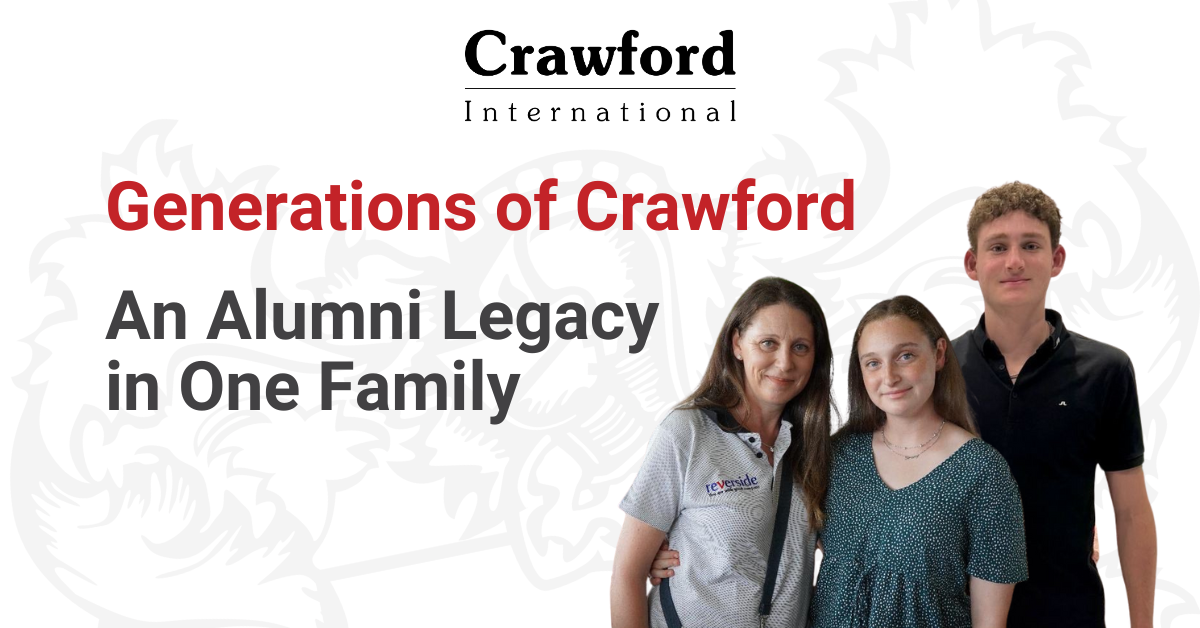
“Two generations. One school. A lifetime of Crawford values.” For the Sher family, Crawford International Sandton is not simply a school they attended; it is a shared chapter written across two generations, shaped by consistent values and evolving opportunity. Dalene Sher matriculated in 1994, earning four distinctions in English, Science, Biology and Latin. Her daughter, Samantha Sher, followed nearly three decades later in 2022, achieving an average of 87.54%, eight distinctions and a Top 5% Commendable Achievement, placing tenth in her grade. In 2025, her son, Justin Sher, completed the journey in exceptional style, with an average of 93.46%, eight distinctions, a Top 5% Outstanding Achievement and first place in his grade. Each result stands on its own merit, yet together they tell a richer story of legacy, growth and shared ethos. Looking back, Dalene describes the experience in three words: legacy, continuity and pride. To see the same school shaping both parent and children across decades is rare and deeply grounding. While Crawford has evolved in facilities, scope and scale, its values have remained remarkably consistent. Experiencing the school first as a student and later as a parent offered a unique perspective, one that revealed how the same environment that once shaped a teenager later helped form confident, capable young adults. Within the Sher household, education was never treated as an isolated outcome. It was a way of life. Curiosity, independence, respect and balance became family language, often reinforced by classroom conversations, parent talks and shared reflection. Academic achievement mattered, but it was always framed as a stepping stone rather than a destination. Confidence of voice, respect for individuality and a belief in lifelong learning became defining Crawfordian traits carried well beyond the school gates. For Samantha and Justin in particular, the shared Crawford experience created an enduring bond. Inside jokes about teachers, traditions, houses and events still surface, along with a deep mutual understanding of the pressures, expectations and opportunities that school life presents. That shared understanding has fostered empathy across generations, bridging past and present with ease. Belonging to the Old Crawfordian Society has extended that connection further. For the Sher family, it represents a sense of belonging beyond graduation, a shared identity that transcends age, along with a healthy dose of traditional rivalry. Staying connected after matric reframes education as a lifelong relationship rather than a single chapter. Through sport, service and cultural involvement, both Samantha and Justin remained connected to younger students, making mentorship and giving back feel like a natural progression rather than an obligation. Alumni communities matter because there is strength in connection. They preserve continuity, provide role models and create networks of practical and emotional support. In sharing their story, the Sher family hopes current students and fellow alumni recognise that education has the power to connect generations, shape families and deepen understanding long after school years have ended. For the Sher family, success has always meant more than results alone. Character over certificates is a guiding principle, even while acknowledging the importance of academic rigour. Living up to one’s potential, pushing natural ability and cultivating resilience, integrity and adaptability remain central to their definition of achievement. Crawford prepared each family member differently, yet from the same foundation. Dalene credits the school with instilling perspective, adaptability and confidence. Samantha found her voice, independence and balance, attributes that supported her transition to international tertiary studies and her leadership within university sport. For Justin, Crawford became a platform for leadership, responsibility and growth, meeting him where he was and enabling him to surpass ambitious goals through service, sport and academic excellence. Their advice to today’s students is simple and wise: focus on process over pressure. Plan early, stay organised, say yes to opportunities and step beyond comfort zones. Balance matters, and fulfilment comes from pursuing what you genuinely enjoy, not what is merely popular. As a family, they describe Crawford International Sandton as “where we learned to grow, question, lead, discover and belong”. Knowing that their story now forms part of Crawford’s broader legacy brings both gratitude and responsibility, an honour coupled with a commitment to contribute meaningfully to the school’s ongoing story. To be a Top Achiever at Crawford is not only about standing at the top of a list. It is about leaving with values that endure, relationships that last and a sense of belonging that carries forward, sometimes, across generations.
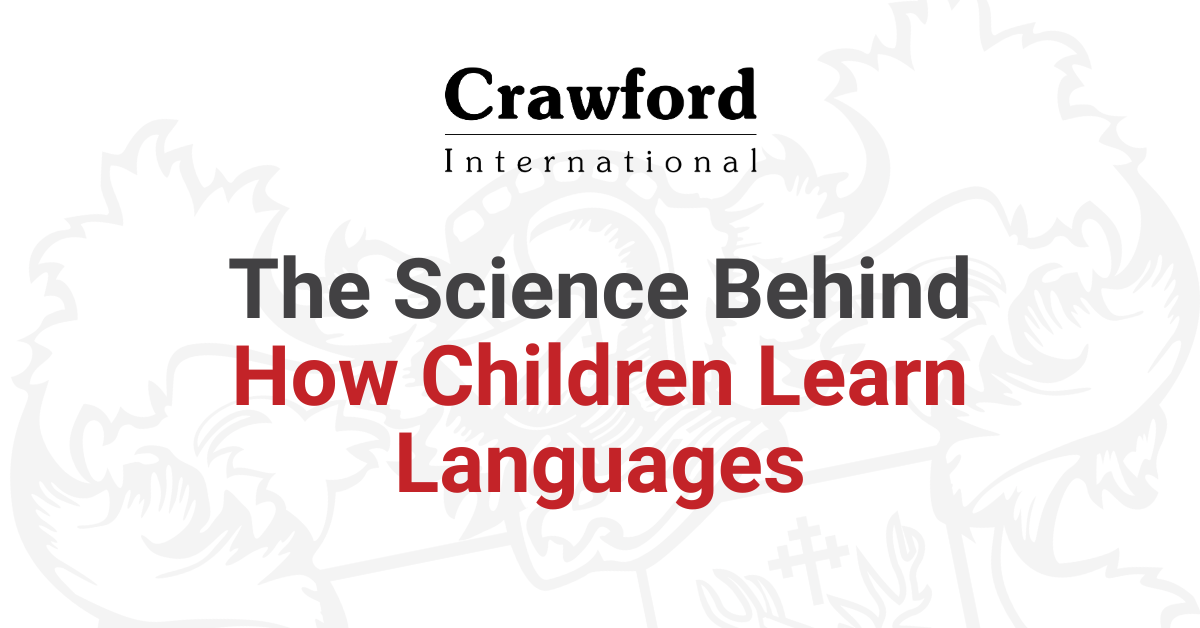
Language development is essential to how students think, communicate and engage with learning. From early sounds to confident speech and writing, language grows through a close relationship between the brain, social interaction plus environment. Recent research continues to deepen our understanding of how children learn languages and how schools and parents can support this process with intention. How the Brain Learns Language Current neuroscience confirms that children are biologically prepared for language learning from birth. The early years remain a sensitive period for language development, during which the brain is especially responsive to sounds, rhythm and structure of language (Gabrieli et al., 2022). Language learning involves several connected brain regions. Areas linked to understanding meaning and producing speech work together through neural pathways that strengthen with repeated use. Studies using brain imaging show that these pathways develop through exposure and interaction rather than direct instruction alone (Skeide and Friederici, 2023). Importantly, the brain learns language through use in real contexts. Children learn words, sentence patterns and meaning by listening, responding and engaging in conversation. This explains why students benefit most from orals, storytelling and meaningful communication across home and school environments. Stages of Language Acquisition While every child develops at their own pace, language acquisition follows a broadly similar sequence. Early on students begin with babbling, experimenting with sounds and intonation. This stage helps the brain map speech sounds and prepares children for spoken language. Single words usually follow. These words often relate to people, objects or actions that are important in the child’s daily life. As understanding grows, children begin combining words into short phrases or sentences. This shows early awareness of meaning and structure. Over time, grammar develops. Sentences become more complex, vocabulary expands and students learn to adapt language for different purposes. By the early school years, most students can use language to explain ideas, ask questions and support learning across subjects (Clark, 2023). Factors That Influence Language Learning Language development is shaped by a combination of exposure, interaction and environment. Exposure to language is critical. Research shows that students who regularly hear varied and meaningful language develop stronger vocabulary and comprehension skills (Romeo et al., 2021). The quality of interaction matters as much as quantity. Responsive conversations, where adults listen and build on what children say, support deeper language growth. Parent child interaction, shared reading and discussion during everyday routines all play a key role. Play also supports language learning. Through play, children practise new words, negotiate meaning and use language socially. Recent studies highlight play as an important context for both spoken language and early literacy development (Weisberg et al., 2022). Bilingualism and Multilingualism Bilingual and multilingual language development continues to be an area of strong research interest especially in the South African school’s context. Evidence from the 2020s confirms that children can learn two or more languages successfully without negative effects on development (De Houwer, 2021). A common misconception is that bilingual children are confused or delayed. Research shows that bilingual students follow the same developmental stages as monolingual students, although vocabulary may be distributed across languages. Mixing languages is a normal and healthy part of bilingual development. There are also cognitive benefits associated with bilingualism. Recent studies link bilingual experience to stronger attention control, flexibility in thinking and awareness of language structure, especially when both languages are supported consistently (Bialystok and Craik, 2022). How Schools and Parents Can Support Language Learning Language development thrives when schools and families work together. Reading remains one of the strongest tools for language growth. Shared reading builds vocabulary, comprehension and confidence. Talking about stories, asking open questions and linking texts to real experiences deepens understanding. Conversation should be encouraged throughout the day. Teachers and parents can model clear, rich language by explaining ideas, introducing new words naturally and encouraging students to express their thinking through inquiry. Vocabulary can be scaffolded by introducing new words in context, revisiting them often and giving students opportunities to use them in speaking and writing. Visual support, discussion and examples all strengthen learning. Creating language-rich environments is essential. Classrooms and homes that value talk, curiosity and listening support students not only in language development, but across all subjects. Language is not only a subject of study, but also the foundation through which students learn, connect and participate fully in the world.

The journey to building global leaders begins long before Matric year. For the Crawford International Class of 2025, it reflects three years of focused preparation, academic support and personal growth through the Crawford Matric Preparation Programme. In the 2025 Independent Examination Board National Senior Certificate examinations, Crawford International students achieved a total of 1 428 distinctions across the group. Twenty-one students recorded overall averages of 90% and above, placing them among the country’s top performers, while a further 126 students achieved averages between 80 and 89%. Among the group’s top academic performers are: Manzil Harikaran Giandev from La Lucia with 11 distinctions, including a 100% in Engineering Graphics Design Sashen Ramlal from Lonehill with 10 distinctions. Shweta Singh from Lonehill earned 9 distinctions. Dristhi Ramsumer from North Coast and Celia Wentzel from Sandton earned 9 distinctions. Sanjana Rajkaran from La Lucia earned 8 distinctions. Tayur Lushen Moodley from North Coast: 8 distinctions. Talia Govender and Keith Makadzange from Pretoria: 8 distinctions. Justin Sher and Mthokozisi Buthelezi from Sandton: 8 distinctions. Together, these students represent the highest individual academic achievements across the group. Beyond individual results, Crawford International students also earned national recognition through the IEB. Seven Commendable Achievement Awards were awarded to students ranked in the Top 5% nationally across five or more subjects. Eight Outstanding Achievement Awards were secured by students ranked in the Top 5% nationally across six or more subjects. Dr Siza Majola, Managing Director of Crawford International, shared: “Congratulations to the Matric Class of 2025. This milestone marks the culmination of years of commitment, perseverance and personal growth. You have faced challenges with resilience, embraced learning and demonstrated the determination required to succeed. As you step into the next chapter, remember that your Crawford education has equipped you with the confidence, leadership skills and values to navigate a world full of opportunity. Your achievements are also a reflection of the unwavering support of parents and teachers who walked this demanding journey with you. Their guidance and belief have played a vital role in your success. Well done, Matric Class of 2025. We are proud of all you have achieved and excited to see what lies ahead.” While these outcomes are academic in nature, Crawford International places equal value on leadership development, sport, service and collaboration. Students are encouraged to lead on the sports field, in cultural spaces, through student leadership structures and within their communities. This approach ensures that students leave school not only well prepared for tertiary study but equipped to contribute meaningfully to diverse environments. Distinctions by Campus: Crawford International Sandton College 370 distinctions Average of 3.6 distinctions per candidate Crawford International La Lucia College 316 distinctions Average of 3.19 distinctions per candidate Crawford International Pretoria College 219 distinctions Average of 2.55 distinctions per candidate Crawford International North Coast College 130 distinctions Average of 2.50 distinctions per candidate Crawford International Lonehill College 253 distinctions Average of 2.16 distinctions per candidate Crawford International Ruimsig College 140 distinctions Average of 1.75 distinctions per candidate Crawford International congratulates every student, teacher and family who contributed to this collective success. We wish the Class of 2025 the very best for the future.

Yvette Rautenbach is Crawford International’s own Renaissance woman: a coffee-loving, quiz-night ace, with a flair for fashion, a knack for interior décor, and a passion for rugby and cricket. But above all, Yvette lives and breathes teaching Afrikaans, bringing her inspired love of the language to her classrooms every day. The Road to Teaching With a BED Degree in Education from the University of KwaZulu-Natal and an Honours degree in Afrikaans from Stellenbosch University, Yvette has pursued her passion for Afrikaans all the way to becoming qualified to study for her master’s degree in 2009. Her journey began with a Grade 12 teacher who brought Afrikaans poetry and literature to life, and Yvette has been paying that inspiration forward ever since. More than Just Subject Matter For Yvette, teaching isn’t only about the curriculum. “How you make students feel can mean more than what you teach them,” she says. Her aim is to create a classroom where students feel supported, safe, and ready to thrive. She’s built connections that last long past graduation, and her proudest moments come from hearing from former students still grateful for her impact. A Day in the Life… Every day is fuelled by her favourite Nescafé Cappuccinos and her fantastic team of Crawford colleagues who, in her words, “make even the most challenging days better.” The autonomy Crawford provides allows her to shape lessons with creativity and passion, a freedom she believes benefits both students and teachers alike. Teaching Philosophy Yvette’s philosophy is simple: teaching with compassion is the key. She believes deeply in lifelong learning, knowing that the quality of her teaching drives the quality of her students’ learning. “Getting the best out of my students demands that I get the best out of me, too,” she says.
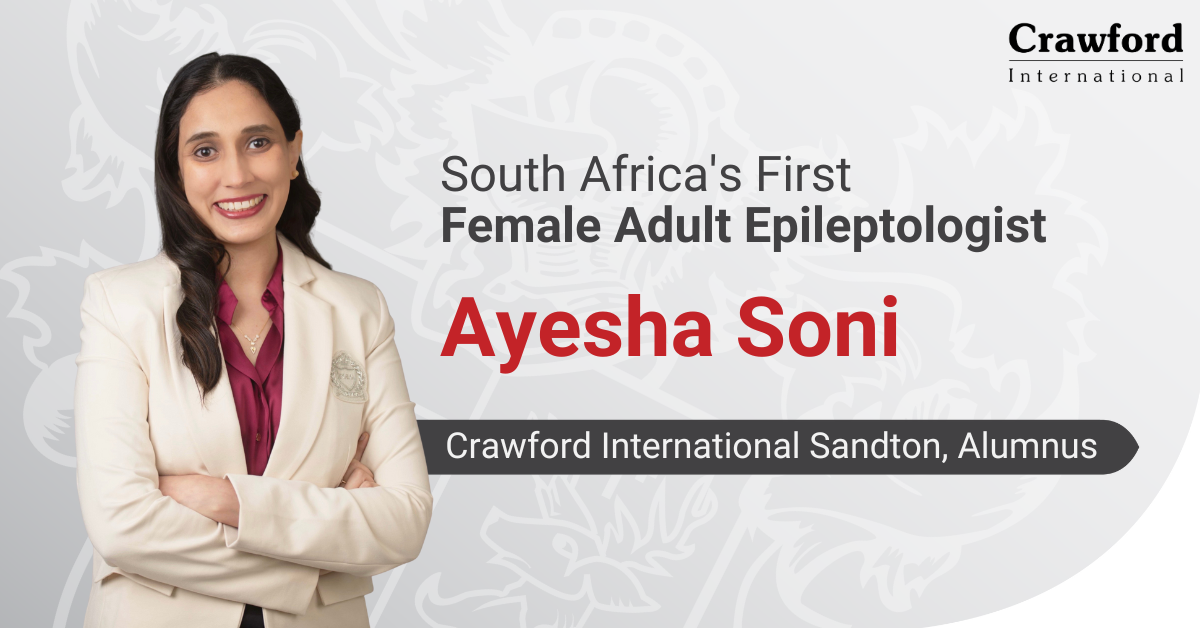
Meet Dr Soni: South Africa’s First Female Adult Epileptologist When Dr Aayesha Jalaluddin Soni walked out of the gates of Crawford College Sandton in 2008, wearing the coveted White Honours Blazer, the school’s highest accolade for excellence in academics, service and culture. Her teachers knew she was destined for greatness. Today, she stands as South Africa’s first female adult epileptologist, a pioneer in her field and a role model to the next generation. After matriculating at Crawford, Aayesha was awarded the University of the Witwatersrand Vice Chancellor Scholarship, one of the university’s most prestigious honours, reserved for the top 10 students across all faculties. She went on to complete her medical degree (MBBCh) in 2014, followed by a Diploma in Primary Emergency Care, a Diploma in Anaesthetics, and her Master of Medicine in Neurology at the University of Cape Town in 2022. Most recently, she completed a fellowship in Epilepsy and Electroencephalography at Western University in Canada, returning home in 2025 to establish her practice in Cape Town. Her academic and professional journey has been matched by outstanding recognition. Among her awards are: 1. American Academy of Neurology International Scholarship Award (2024) 2. International Federation of Clinical Neurophysiology Education Fellowship Award (2024/25) 3. Canadian League Against Epilepsy J. Kiffin Penry Award (2025) 4. Palatucci Advocacy Leadership Forum Advocate, American Academy of Neurology (2025) – one of only two international advocates selected worldwide 5. Mail & Guardian Top 200 Young South Africans (2017, Health category) 6. News24’s 100 Young Mandelas of the Future (2018, Leadership category) Alongside these accolades, Aayesha has authored more than 15 peer-reviewed scientific publications, advancing knowledge in epilepsy surgery outcomes, neurological disorders, and care in resource-limited settings. Yet what sets her apart is her service. She has volunteered with Gift of the Givers, continues to give her time as a consultant pro Bono at Groote Schuur Hospital, and uses her voice to advocate for justice and global human rights violations via mainstream media writings. Her return to South Africa has brought a unique skill set to a health system in need, expanding access to world-class epilepsy care. Her achievements have been celebrated nationally, including recent media features: 1. UCT News: First female adult epileptologist leads the way ( https://www.news.uct.ac.za/article/-2025-08-25-first-female-adult-epileptologist-leads-the-way ) 2. News24: Back home from Canada, epilepsy specialist brings unique skill back to SA ( https://www.news24.com/southafrica/good-news/back-home-from-canada-epilepsy-specialist-brings-unique-skill-back-to-sa-20250831-1068 ) Through it all, she continues to embody the values first nurtured at Crawford International Sandton College: academic excellence, leadership, service, and integrity. The White Honours Blazer she wore in 2008 was not just an award, it was the foundation of a life dedicated to uplifting others. Today, Crawford is proud to celebrate one of its own, whose journey from our classrooms to the world stage reminds us that education, compassion, and determination can change lives.

ALUMNI SPOTLIGHT: KEITH Saramago Crawford International Lonehill | Class of 2013 From a spirited student on the soccer field to a professional, navigating global financial markets, Keith Saramago’s journey is grounded in resilience, clarity and purpose. Keith matriculated from Crawford International Lonehill in 2013. One of his standout memories was helping his team win a soccer competition at an inter-campus event. “We were the underdogs, but we played with heart. That win taught me early on that belief and teamwork can shift outcomes,” he recalls. After school, Keith pursued a Bachelor of Commerce Honours in Financial Analysis at Stellenbosch University. There, he encountered mentors who guided him through his postgraduate studies and helped him understand how to shape his ambitions into a viable career path. “Those mentors helped me map out not only my strengths but also what to expect when entering a competitive field,” he says. Keith now works as a Treasury Dealer, focusing on foreign exchange and money market funds for various South African corporates. What keeps him engaged is the unpredictability of the work. “Financial markets respond to global trends in real time. No day is ever the same, and that constant shift is what I thrive on,” he shares. He credits Crawford for helping him build a strong foundation. “Crawford gave me the confidence to speak up and engage meaningfully with others. It helped me develop a point of view and the courage to stand by it,” he says. He also speaks to the importance of staying grounded. “Respecting others while remaining true to yourself is a lesson I continue to apply,” he adds. Outside the professional world, Keith treasures building a life with his wife, calling their marriage one of his proudest achievements. He stays in close contact with many of his former classmates and values those bonds deeply. “We still catch up often. Some of us have moved across the globe, but the friendships have remained intact.” Looking ahead, he plans to further his studies and explore new professional opportunities across the continent and abroad. His advice to current students is straightforward: “Identify what you love and pursue it with intention. Silence the noise and trust what you know is meant for you.” Keith’s story reflects the balance between professional excellence and personal fulfilment and the courage to stay true to both.




